You may have noticed that your baby farts a lot after feeding or generally throughout the day.
Fortunately, there’s usually no need to worry as most of the time it’s not that threatening of an issue.
Babies, much like most adults, tend to pass gas quite often throughout the day, though most times it goes unnoticed with the highest amount of toots being performed during the night when they’re asleep.
The main reason your little one ends up farting more often is due to your baby’s digestive system that is still developing and growing.
For you see, it lacks all of the helpful bacterial flora found within our own that helps break food down faster and allows it to pass through a lot quicker as well.

Meanwhile, the food that a baby ingests ends up lingering for quite a bit due to a slower metabolism, which ends up building gas inside the digestive tract, creating air bubbles/gas that he then passes along.
This is why we don’t start our babies off with solids right off the bat and instead rely on our breast milk or baby formulas.
Not only are they packed full of useful nutrients, they’re a lot easier to digest at the start, so your little one’s body won’t have to work too hard to extract said nutrients.
But what other causes are there? It’s not just that a baby’s tummy is slow to digest foods, there are other potential factors that contribute to gassy buildups and bloating.
You’ll find that a few of them are ones even us adults struggle with.
What Makes My Baby Fart A Lot?
1. A poor latch

One of the most common issues as to why our precious kids end up suffering from excessive gas is simply because we might be feeding them improperly.
And by that I don’t mean giving them the wrong foods, but rather that our breastfeeding position might be compromising our baby’s feeding time by allowing extra air to enter alongside the breast milk.
While most babies end up gulping up some air during the day, repeatedly poor breastfeeding or bottle feeding sessions will make all of that add up to a whole lot of air.
And that, in turn, leads to bloating, which will increase a baby’s fussiness and gassiness as his discomfort grows.
And he’ll stay this way until this excess gas passes through his digestive system and leaves his body one small gas bubble at a time.
2. Increased milk flow

While a lot less frequent, having an overabundant milk flow can also lead to a baby passing gas a lot more often than usual.
This is because he might be struggling with the stronger flow of milk and has to resort to gulping to not drown in it.
This ends up with the same results as having a poor latch where, as the baby struggles, he ends up swallowing a lot of excess air, leading to a fussy and gassy baby and thus increasing the chance of colic.
And then, much like with the first issue, he’ll have to deal with the bloating until the extra gas from his little tummy is released to “deflate” him.
3. An immature digestive system
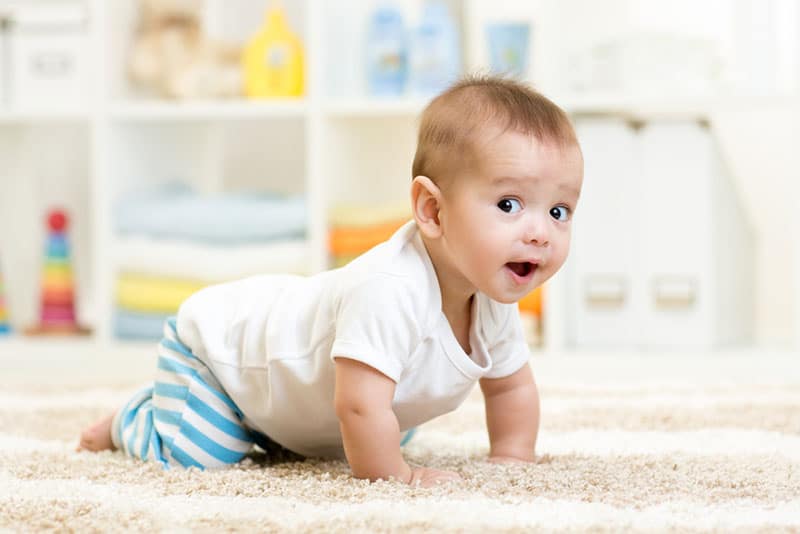
As I’ve mentioned at the start, a baby’s digestive system is rather underdeveloped compared to the ones that we as adults have.
It lacks the good bacteria that normally reside inside which help with digesting all of the food we ingest, making a baby’s bowel movements slower than ours and allowing gas to build up.
It’s more of an issue during the transfer from breast milk and baby formulas to solid foods rather than during the newborn stage, but it’s something to be aware of if you’re worried about your baby’s gas frequency.
4. Food intolerances or allergies

Much like with any human being, food intolerances and allergies play a big part in causing issues with our bowels.
Some might be less sensitive to it while others feel every slight shift in their nutrition plan.
One of the most common problems that relates to this is lactose intolerance, a sugar most often found in cow’s milk that everyone’s intolerant to to some degree.
That intolerance rises as we grow older, but some people are born being completely intolerant to it from the start.
If you see your child looking uncomfortable or in distress shortly after drinking cow’s milk, if he’s feeling bloated or you end up having a baby that farts a lot as well as having his tummy rumble, it’s likely that he’s lactose intolerant.
Being lactose intolerant can also cause more frequent and runny poops.
Since the body struggles to digest this sugar without the necessary enzyme to deconstruct it, the body just wants to eject it as fast as it can.
But that isn’t the only sort of food that a baby might be allergic or intolerant to – there are a number of other things that agitate the system and that list is different for every person.
It’s a lot of trial and error, but if you see that something is causing your kid more distress, just remove it from his food plan.
This also pertains to baby formulas as they too can have some contents that cause allergies in certain children.
Not only that, the food you ingest yourself may have a part to play as some of those ingredients end up getting mixed into your breast milk.
So, if you start noticing any problems during breastfeeding, look back at what you’ve eaten and what might have caused this issue in the first place.
5. Stress

Stress seems to be an ever-present problem in our modern age and it affects all ages, no matter how old or how young we are. And our kids are no different.
They might get upset that something they’re trying to do isn’t working and simply can’t understand why, so they instantly hit panic mode and anxiety builds up while they try to cope.
They might also be absorbing the general ambience of the room depending on who’s around them, hence why people don’t recommend having heated discussions around children or scolding them too harshly for that matter.
All of it plays a part in not raising stress levels.
While some people can deal with stress quite well, it’s not uncommon to have all of that stress hit our stomachs, leading to gas buildup, cramping, diarrhea, and the like.
A baby experiences all of this too (albeit less frequently, but they still do), so keep thia in mind if your baby farts a lot and you want to deal with it.
6. Bacterial imbalance from medicinal intake
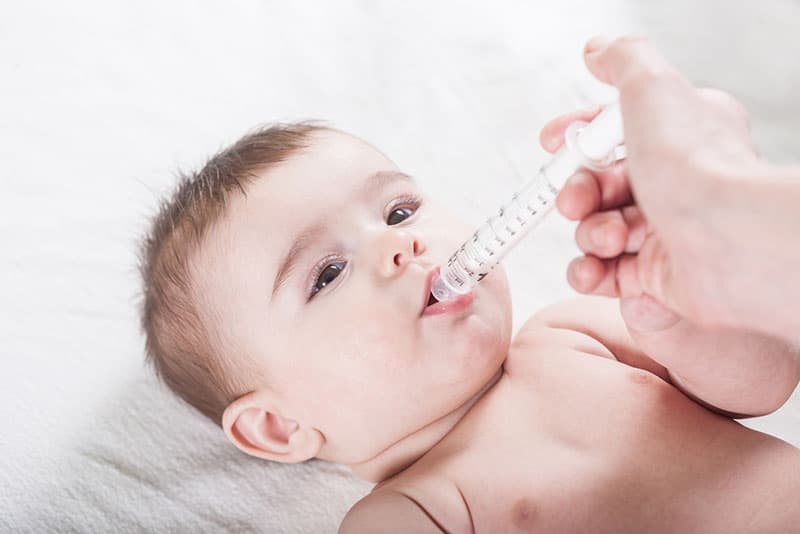
This one goes without saying, but medication is often a factor of increased baby gas, among other potential side-effects from your child taking medication.
That’s because all of the probiotics and antibiotics tend to cause an imbalance within the digestive system, with either an overabundance of bacteria or lack thereof, leading to either a few smelly farts or a lot of innocent ones.
Whatever the case, having a bacterial imbalance within one’s bowels will lead to heavier flatulence as the body starts getting back to normal levels.
The same goes for you as well. There’s a reason why doctors tell us that we aren’t supposed to take any heavy medication during pregnancy or the breastfeeding period, as traces of whatever we ingest can end up inside our breast milk too.
7. A lack of mobility

When the baby is still young – when he hasn’t yet learned to crawl or walk and spends most of his time being carried around or sleeping – a shift happens inside his body.
You see, when our doctors tell us to stretch our legs every day and when they keep telling us that walking is healthy, they don’t just mean that for your legs.
Walking helps promote healthy and regular bowel movements as well, given how our entire organism is still made up of muscles, albeit a different kind.
They’re not the kind that you can work out, but they’re there and they still need to be “stretched out” daily, otherwise they become complacent and our metabolism slows down as a result.
The more we move, the more efficient our digestive tract is at processing food and allowing us to have regular number ones and number twos, as well as a healthy level of gas expression without allowing bloating to occur due to gas buildup.
And not only bloating, but constipation as well.
If your child has moved onto more solid foods, chances are that if he’s not being active enough, he might become constipated due to his digestive system becoming too lazy and lethargic.
So be sure not to just have your little one lie around, but to get some movement in if he starts having issues with a lot of excess gas.
Thankfully, this is less of a problem with infants since breastfed babies and formula fed babies don’t really end up making many solid poops (though it can happen).
That said, as long as your little one’s stools continue being soft and regular, you don’t have to worry about him being constipated.
How To Fix The Problem Of Increased Flatulence
1. Keep your baby moving
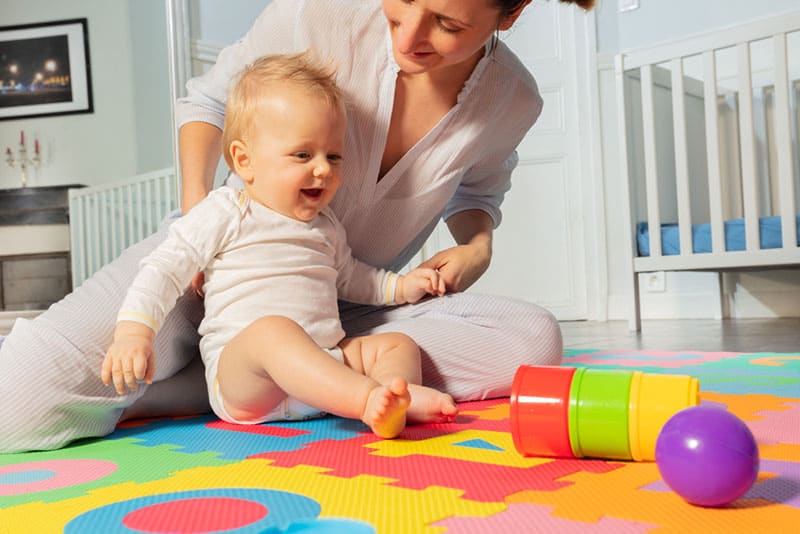
As mentioned before, the more the body moves, the better the bowels digest the food, which will lead to the baby farting a lot less.
In the baby’s case, make sure to do some light baby exercises or keep him entertained with some silly games that will lead him to move often, in turn aiding his digestion.
Even just bouncing him lightly on your lap can do the trick, as long as he’s doing some sort of physical movement.
If you’re still worried that your baby farts a lot, you may want to devote a few minutes to tummy time where you have your baby lie on his stomach and try doing little flexes upwards with his limbs.
It’ll help his body stretch and keep his digestive system rolling.
2. Burp your child after every feeding / every time he’s fussy

The tried and true tradition of getting rid of excess gas in babies and arguably the best way to do so.
If you manage to push the gas up so it exits through your little one’s mouth, then it won’t end up going down his tummy and out of his little tush.
It’s guaranteed to give them a sense of instant relief and will reduce bloating momentarily, no matter the source.
Do be careful of any potential spit-up accompanying the burping by preparing a towel or a burp cloth beforehand and placing it over the shoulder you’re doing the burping on.
3. Eliminate gas-inducing foods from your and your baby’s diets
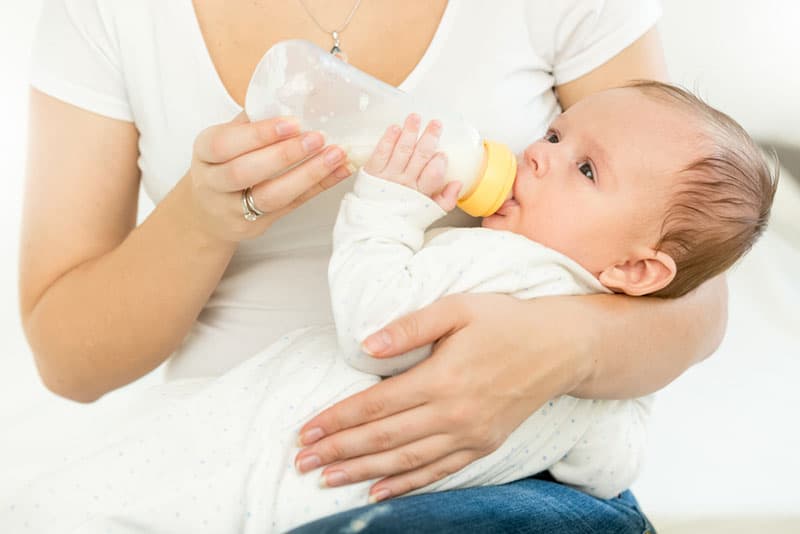
The main culprit of gas is always going to be food as that’s the thing that our digestive tract was designed to process, so it’s only natural that some foods may cause more gas than others.
Some of the worst offenders are cow’s milk (due to the various sugars and proteins contained within like lactose, whey, and casein, which tend to bloat anyone up quite quickly) as well as anything containing whole grains.
Some artificial dyes and flavorings can also contribute to bloated tummies, so it’s important to always be on the lookout on what is affecting your child’s digestive tract the most.
But, as I’ve touched on before, what you eat also matters if your child is still breastfeeding.
What you eat is bound to end up passing through in your breast milk, so be selective about your own diet as well.
The easiest way to do this is to try to avoid high-FODMAP foods as much as you can.
These are foods that are known to be hard to digest and will thus linger in our intestines for longer, causing quite the gas buildup.
The most common high-FODMAP foods are garlic, beans, lentils, kale, onions, wheat, and cauliflower.
Naturally, they aren’t the only ones, but they’re some that you should keep an eye out for so as to not overload on them and give both yourself and your baby a hard time digesting.
4. Massage your baby’s tummy
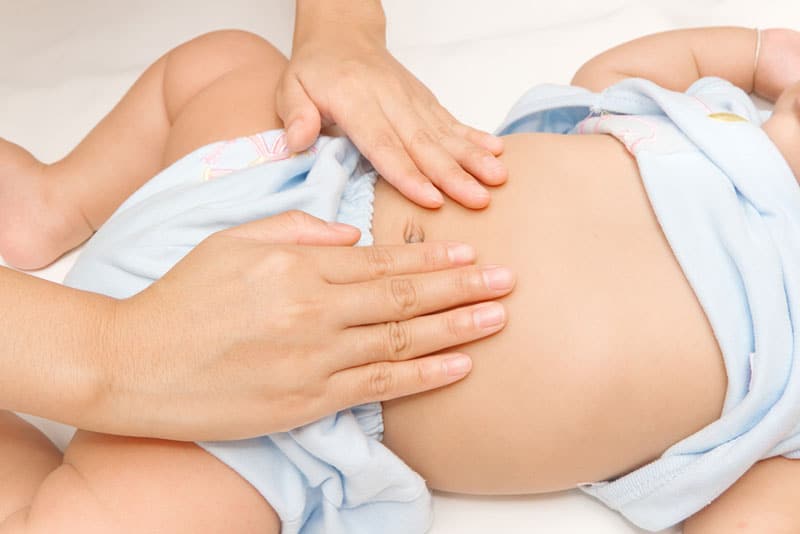
If you can’t get your child to exercise, or if he’s exercising but it still isn’t enough, you may want to try giving him a tummy massage.
Simply put your fingers to the sides of his stomach and make gentle, circular motions while applying only a little bit of pressure to give those intestines a bit of a helping hand.
While simple, it’s still a relatively effective solution and an enjoyable experience for your child – after all, it means more contact with mommy!
5. Give him a warm bath

Should stress be an issue or overall constipation, giving your baby a warm bath might help relieve any tenseness that he may have.
As we know, warm baths are known to be quite relaxing, just make sure that it’s not too hot so as not to scald your baby’s sensitive skin in the process.
If done right, it can be a very efficient method of remedying gassiness so that your baby farts a lot less in the future.
In Conclusion
Whether your baby farts a lot or not shouldn’t be too big of a concern in most cases.
But, if you see that your child is clearly struggling with being bloated or if passing way more gas than he normally does, you may want to try some of the aforementioned methods.
If none of them work, feel free to contact your pediatrician and schedule an appointment so they can take a look if there’s some other underlying issue at play here.
But again, most times it’s no cause for worry as most of these issues can be alleviated rather quickly – it’s just a matter of figuring out what exactly the problem is.
READ NEXT: Causes, Symptoms And Treatment Of Baby’s Upset Stomach
Like this post? Please share or pin it for later. You can also stay in the loop and follow us on Facebook, Instagram and Pinterest.

This post contains affiliate links. Please see our full disclosure or more info.

